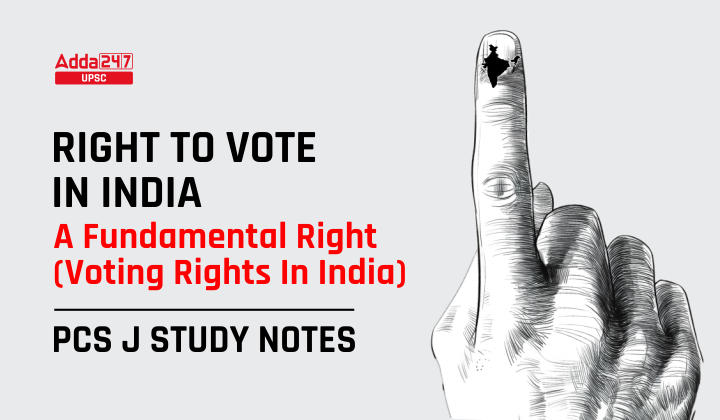Table of Contents
The upcoming 18th Lok Sabha election in India, scheduled for April and May 2024, is a pivotal democratic event, where 543 members of the lower house of Parliament will be elected. These alliances and their member parties are gearing up for a comprehensive electoral battle, emphasizing the critical role of every eligible voter, particularly the youth, in shaping the country’s future.
What is Right to Vote?
The right to vote in India is considered a fundamental right of every citizen in a democratic nation. In India, the right to vote is enshrined in the Constitution and is available to all citizens who are 18 years of age or older. In this article, we will explore the Right To Vote In India in depth. The viewers can read this article to know the details and importance of the Right To Vote In India.
The Constitution of India and the Right to Vote
The Constitution of India was adopted in 1950 and provides for the Right To Vote In India as a fundamental right of every citizen. Article 326 of the Constitution states that “the elections to the House of the People and to the Legislative Assemblies of States shall be based on adult suffrage.” This means that every citizen of India who is 18 years of age or older has the Right To Vote In Indian elections.
The Right to Vote in India and the Election Commission of India
The Election Commission of India is the body responsible for conducting elections in the country. It is an independent body and has the power to conduct elections to the Lok Sabha, Rajya Sabha, State Legislative Assemblies, and the offices of the President and Vice-President of India. The Election Commission of India is responsible for ensuring free and fair elections in the country. It transparently conducts elections, and all citizens who are eligible to vote are encouraged to do so.
How to Register to Vote in India
To exercise the right to vote in India, citizens must first register to vote. The process of voter registration is simple and can be completed online or offline. The article will take to through how you can practice your right to vote in India. If you follow the process you will be able to practice your right to vote in India. Here are the steps to register to vote in India:
- Visit the website of the Election Commission of India.
- Click on the “National Voter’s Service Portal” link.
- Click on the “Register” button.
- Fill in the required details such as name, address, age, etc.
- Upload a photograph and a copy of identity proof such as a passport, driving license, PAN card, etc.
- Click on the “Submit” button.
Once the registration is complete, the voter ID card will be sent to the registered address of the voter. The voter ID card is an important document that allows citizens to exercise their right to vote.
Importance of the Right to Vote in India
The right to vote in India is essential in a democratic society. It allows citizens to participate in the decision-making process and elect representatives who will govern the country. By casting their vote, citizens can have a say in the policies and decisions that affect their lives. The right to vote in India also ensures that the government is accountable to the people and is a cornerstone of a functioning democracy.
Right to Vote in India
Article 326 of the Indian Constitution: Guarantees the right to vote under adult suffrage, making the electoral process accessible to citizens 18 years and older, with exceptions for disqualifications such as non-residence, unsoundness of mind, crime, or involvement in corrupt or illegal practices.
- Democratic Ethos- Reflects India’s commitment to democracy, ensuring every eligible citizen’s participation in the electoral process.
- History of Voting Rights in India- Shows a progressive evolution aimed at expanding democratic participation.
- Initial Voting Age- This was set at 21 years, aligning with many global democracies.
- 61st Amendment Act of 1988- Lowered the voting age to 18 years, recognizing the importance of engaging younger citizens in the political process.
Reforms in Right to Vote
- Electoral Reforms- Recent reforms focus on promoting scientific research into voter behavior, introducing the “NOTA” (None Of The Above) option, and enhancing voter education and accessibility.
- Model Polling Booths- Aimed at improving the voting experience, ensuring that polling stations are equipped and managed to facilitate easy and efficient voter participation.
- SVEEP Program- The Systematic Voters’ Education and Electoral Participation program focuses on increasing electoral engagement through education and awareness initiatives.
Universal Adult Franchise
The Universal Adult Franchise, also known as universal suffrage, is a fundamental democratic principle ensuring that all citizens aged 18 and above have the right to vote. This right is granted without discrimination based on caste, education, religion, color, race, or economic status.



 TSPSC Group 1 Question Paper 2024, Downl...
TSPSC Group 1 Question Paper 2024, Downl...
 TSPSC Group 1 Answer key 2024 Out, Downl...
TSPSC Group 1 Answer key 2024 Out, Downl...
 UPSC Prelims 2024 Question Paper, Downlo...
UPSC Prelims 2024 Question Paper, Downlo...







